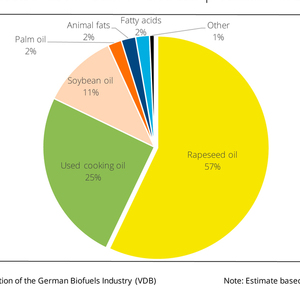Rapeseed oil remains primary feedstock for German biodiesel

July 22, 2020
BY UFOP
The 2020 rapeseed harvest will likely once more be lower than average, but this is not due to shrinking demand, according to Germany’s Union zur Förderung von Oel- und Proteinpflanzen (UFOP), referring to the German biodiesel industry’s feedstock requirements. In 2019, the industry produced 3.4 million tons (1.02 billion gallons) of biodiesel, of which about 1.9 million tons were based on rapeseed oil. UFOP has pointed out that in view of the upcoming sowings, the producer price should pull the area sown to ensure that the feedstock supply chain is as short as possible.
Due to the poor growing conditions, the German rapeseed harvest will presumably be small again. According to the latest estimate of the German Raiffeisenverband (association of the agricultural cooperatives), this year’s rapeseed harvest will be 14 percent larger year-on-year at 3.2 million tons, but it would still fall approximately 21 percent short of the five-year average. UFOP has explained that one of the reasons is that with approximately 1 million hectares under rapeseed cultivation, the potential of area is far from being fully exploited.
Incentives for expanding the rapeseed area should come from producer prices, along with good sowing conditions from the end of August to the beginning of September. Forward contract prices are presently at approximately 364 euros per ton, approximately 200 euros per ton higher than those for wheat. Prices are supported by the fact that the rapeseed market in the European Union is characterized by a permanent shortage of cover to operate processing plants at full capacity. More specifically, according to statistics provided by the German Federal Office for Agriculture and Food (BLE), approximately 9 million tons of rapeseed were processed in German oil mills in 2019—of which, according to calculations made by Agrarmarkt Informations-Gesellschaft (mbH), almost 3.9 million tons were of German origin—yielding about 3.8 million tons of rapeseed oil. UFOP has concluded that, consequently, demand for rapeseed in Germany remains strong.
Advertisement
Advertisement
Underlining the overall importance of rapeseed cultivation, the association has pointed out that, at the same time, flowering rapeseed fields and the integrated value chains associated with rapeseed processing—from GM-free fodder production to certified pharmaceutical glycerin—have a positive impact on the image of biodiesel, both among the public and in politics.
According to the Association of the German Biofuels Industry (Verband der Deutschen Biokraftstoffindustrie), in 2019 about 3.4 million tons of biodiesel were produced in Germany alone. The primary feedstock was rapeseed oil, as it was in previous years, which accounted for 57 percent. The use of used cooking oil and fats declined just less than 2 percentage points to 25 percent year-on-year. The role of soybean oil, accounting for 11 percent, increased somewhat compared to 2018 (8 percent). The percentage of palm oil remained unchanged from the previous year at a relatively low 2 percent. Animal fats, fatty acids and other feedstocks together accounted for no more than 5 percent.
Advertisement
Advertisement
Related Stories
The USDA maintained its outlook for 2025-’26 soybean oil use in biofuel production in its latest World Agricultural Supply and Demand Estimates report, released Aug. 12. The forecast for soybean oil prices was also unchanged.
U.S. soybean production for 2025 is forecast at 4.29 billion bushels, down 2% when compared to last year, according to the USDA National Agricultural Statistics Service’s latest monthly Crop Production report, released Aug. 12.
California’s new specified source feedstock attestation requirement: A critical new compliance step for renewable fuel producers
As of July 2025, California’s SCFS requires renewable fuel producers using specified source feedstocks to secure attestation letters reaching back to the point of origin. This marks a significant shift in compliance expectations.
At the University of Missouri, plant biochemist Jay Thelen is using arabidopsis as a powerful model to explore ways to boost oil production — an important step toward creating more sustainable, plant-based energy sources.
Iowa farmers have a new market opportunity for their 2025 soybean crop. Landus is expanding its Clean Fuel Regulation initiative, made possible by recent policy changes expected to increase Canada's demand for liquid biofuel.
Upcoming Events










